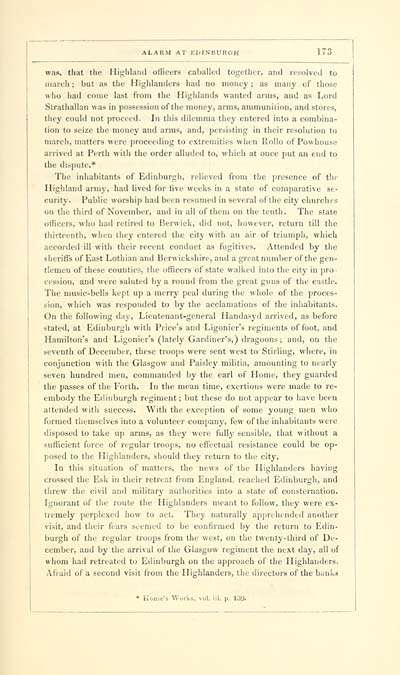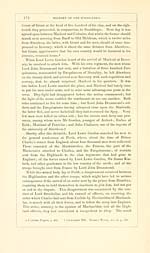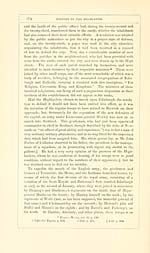Download files
Complete book:
Individual page:
Thumbnail gallery: Grid view | List view

ALARM AT EDINBURGH 173
was, that the Higliland officers caballed together, and resolved to
march ; but as the Highlanders had no money ; as many of tliose
who had come last from the Highlands wanted arms, and as Lord
Strathallan was in possession of the money, arms, ammunition, and stores,
they could not proceed. In this dilemma they entered into a combina-
tion to seize the money and arms, and, persisting in their resolution to
march, matters were proceeding to extremities when Rollo of Powhouse
arrived at Perth with the order alluded to, which at once put an end to
the dispute.*
The inhabitants of Edinburgh, relieved from the presence of the
Highland army, had lived for live weeks in a state of comparative se-
curity. Public worship had been resumed in several of the city churches
on the third of November, and in all of them on the tenth. The state
officers, who had retired to Berwick, did not, however, return till the
thirteenth, when they entered the city with an air of triumph, which
accorded ill with their recent conduct as fugitives. Attended by the
sheriffs of East Lothian and Berwickshire, and a great number of the gen-
tlemen of these counties, the officers of state walked into the city in pro
cession, and were saluted by a round from the great guns of the castle.
The music-bells kept up a merry peal during the whole of the proces-
sion, which was responded to by the acclamations of the inhabitants.
On the following day. Lieutenant-general Handasj'd arrived, as before
stated, at Edinburgh with Price's and Ligonier's regiments of foot, and
Hamilton's and Ligonier's (lately Gardiner's,) dragoons ; and, on the
seventh of December, these troops were sent west to Stirling, where, in
conjunction with the Glasgow and Paisley militia, amounting to nearly
seven hundred men, commanded by the earl of Home, they guarded
the passes of the Forth. Li the mean time, exertions were made to re-
embody the Edinburgh regiment ; but these do not appear to have been
attended with success. With the exception of some young men who
formed themselves into a volunteer company, few of the inhabitants were
disposed to take up arms, as they were fully sensible, that without a
sufficient force of regular troops, no effectual resistance could be op-
posed to the Highlanders, should they return to the city.
In this situation of matters, the news of the Highlanders having
crossed the Esk in their retreat from England, reached Edinburgh, and
threw the civil and military authorities into a state of consternation.
Ignorant of the route the Highlanders meant to follow, they were ex-
tremely perplexed how to act. They naturally apprehended another
visit, and their fears seemed to be confirmed by the return to Edin-
burgh of the regular troops from the west, on the twenty-third of De-
cember, and by the arrival of the Glasgow regiment the next day, all of
whom had retreated to Edinburgh on the approach of the Highlanders.
Afraid of a second visit from the Highlanders, the directors of the bemks
• Woine-s WurKs, vol. iii. p. lag.
was, that the Higliland officers caballed together, and resolved to
march ; but as the Highlanders had no money ; as many of tliose
who had come last from the Highlands wanted arms, and as Lord
Strathallan was in possession of the money, arms, ammunition, and stores,
they could not proceed. In this dilemma they entered into a combina-
tion to seize the money and arms, and, persisting in their resolution to
march, matters were proceeding to extremities when Rollo of Powhouse
arrived at Perth with the order alluded to, which at once put an end to
the dispute.*
The inhabitants of Edinburgh, relieved from the presence of the
Highland army, had lived for live weeks in a state of comparative se-
curity. Public worship had been resumed in several of the city churches
on the third of November, and in all of them on the tenth. The state
officers, who had retired to Berwick, did not, however, return till the
thirteenth, when they entered the city with an air of triumph, which
accorded ill with their recent conduct as fugitives. Attended by the
sheriffs of East Lothian and Berwickshire, and a great number of the gen-
tlemen of these counties, the officers of state walked into the city in pro
cession, and were saluted by a round from the great guns of the castle.
The music-bells kept up a merry peal during the whole of the proces-
sion, which was responded to by the acclamations of the inhabitants.
On the following day. Lieutenant-general Handasj'd arrived, as before
stated, at Edinburgh with Price's and Ligonier's regiments of foot, and
Hamilton's and Ligonier's (lately Gardiner's,) dragoons ; and, on the
seventh of December, these troops were sent west to Stirling, where, in
conjunction with the Glasgow and Paisley militia, amounting to nearly
seven hundred men, commanded by the earl of Home, they guarded
the passes of the Forth. Li the mean time, exertions were made to re-
embody the Edinburgh regiment ; but these do not appear to have been
attended with success. With the exception of some young men who
formed themselves into a volunteer company, few of the inhabitants were
disposed to take up arms, as they were fully sensible, that without a
sufficient force of regular troops, no effectual resistance could be op-
posed to the Highlanders, should they return to the city.
In this situation of matters, the news of the Highlanders having
crossed the Esk in their retreat from England, reached Edinburgh, and
threw the civil and military authorities into a state of consternation.
Ignorant of the route the Highlanders meant to follow, they were ex-
tremely perplexed how to act. They naturally apprehended another
visit, and their fears seemed to be confirmed by the return to Edin-
burgh of the regular troops from the west, on the twenty-third of De-
cember, and by the arrival of the Glasgow regiment the next day, all of
whom had retreated to Edinburgh on the approach of the Highlanders.
Afraid of a second visit from the Highlanders, the directors of the bemks
• Woine-s WurKs, vol. iii. p. lag.
Set display mode to: Large image | Transcription
Images and transcriptions on this page, including medium image downloads, may be used under the Creative Commons Attribution 4.0 International Licence unless otherwise stated. ![]()
| Early Gaelic Book Collections > Ossian Collection > History of the Highlands and of the Highland clans > Volume 3 > (203) |
|---|
| Permanent URL | https://digital.nls.uk/79654858 |
|---|
| Description | Vol. III. |
|---|---|
| Shelfmark | Oss.249 |
| Attribution and copyright: |
|
| Description | Selected books from the Ossian Collection of 327 volumes, originally assembled by J. Norman Methven of Perth. Different editions and translations of James MacPherson's epic poem 'Ossian', some with a map of the 'Kingdom of Connor'. Also secondary material relating to Ossianic poetry and the Ossian controversy. |
|---|
| Description | Selected items from five 'Special and Named Printed Collections'. Includes books in Gaelic and other Celtic languages, works about the Gaels, their languages, literature, culture and history. |
|---|

